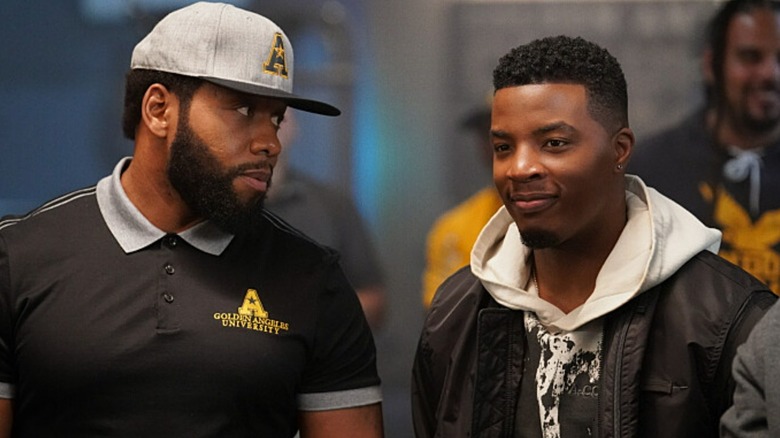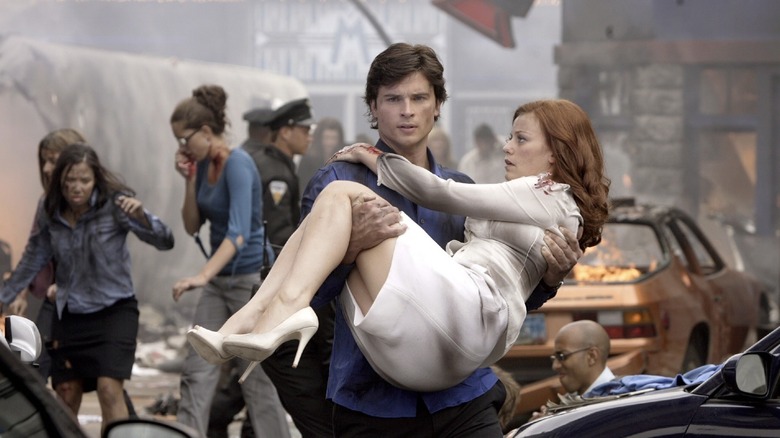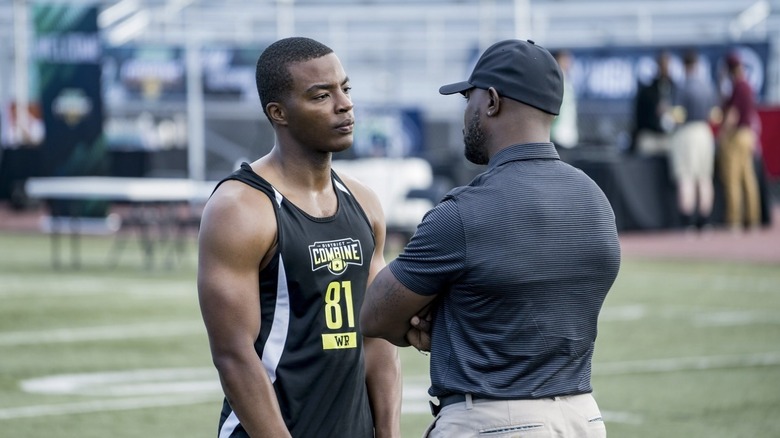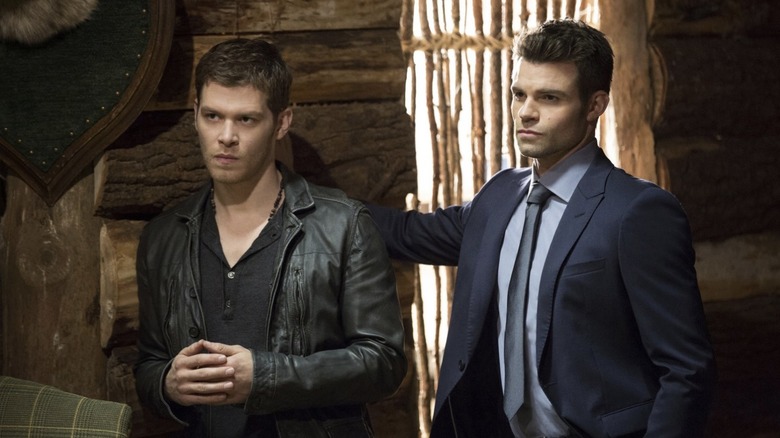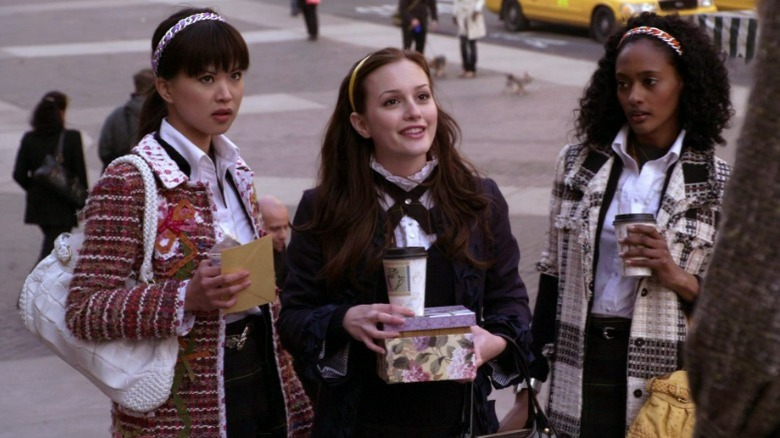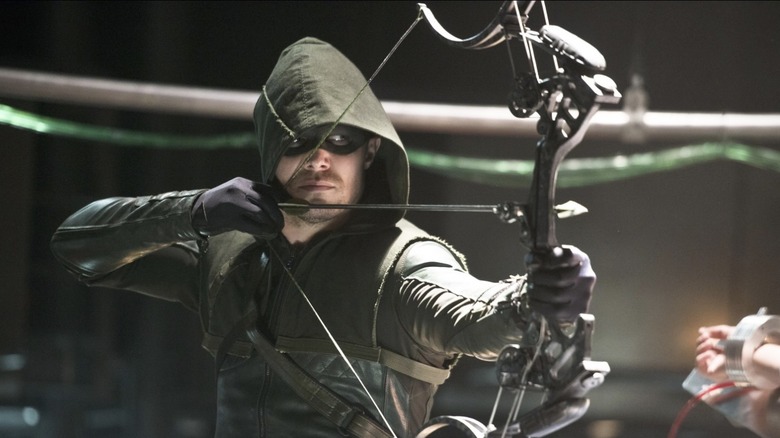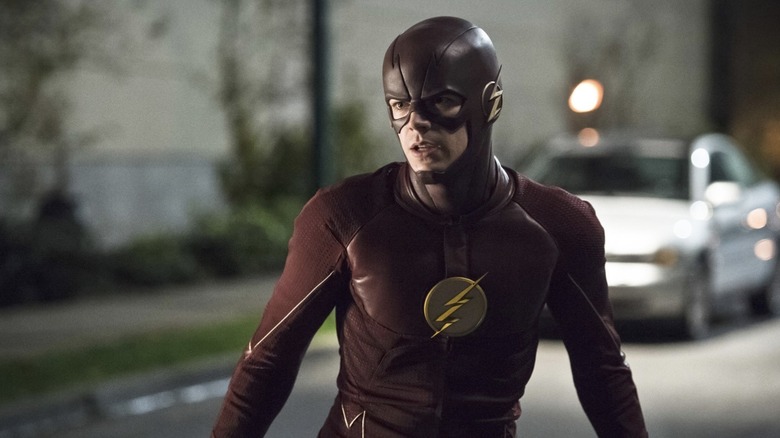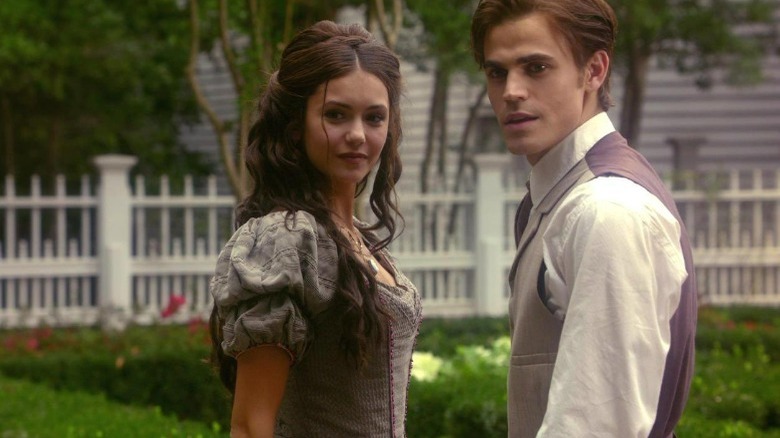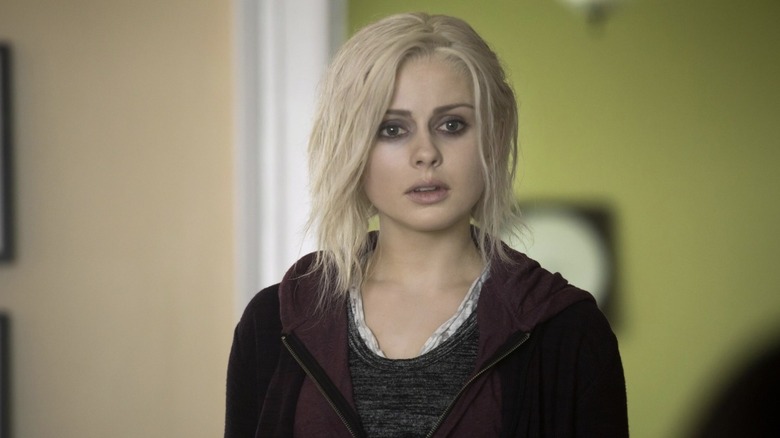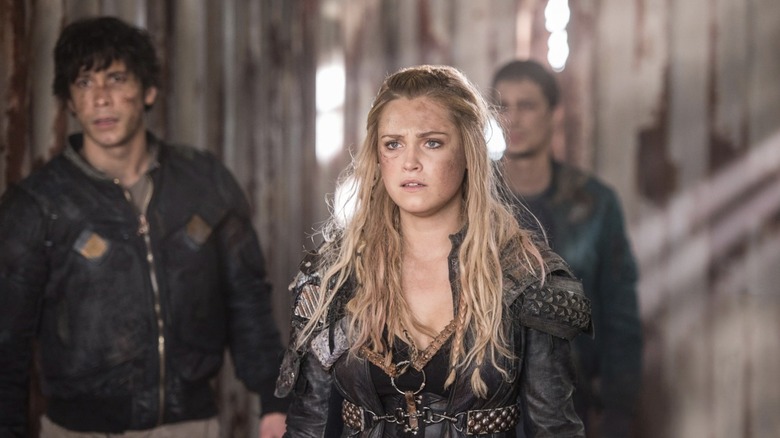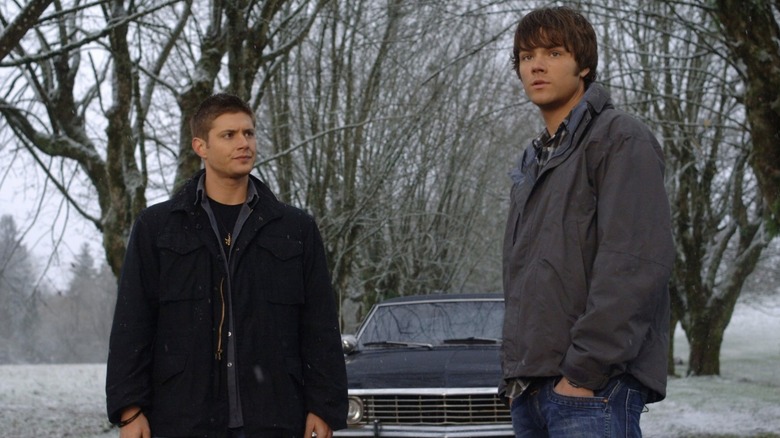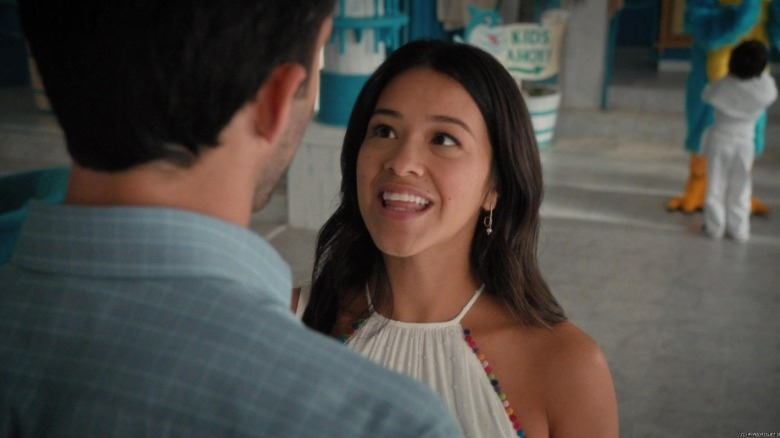12 Best CW Shows Of All Time Ranked
In 2006, ABC News announced that a new network, The CW, would launch by bringing two struggling networks, UPN and The WB, together. The new network would feature the strongest series from both networks and be geared toward young and minority audiences, two demographics underserved by the four major networks at the time.
Series targeting a young audience, including genre staples that arguably changed television, matriculated to The CW, setting the tone for the future of the network. "Gilmore Girls," "Smallville," "One Tree Hill," "Veronica Mars," and "Supernatural" became the template The CW would use to build its programming. This strategy inspired programming that embraced high production values and character-driven stories targeted at a young female audience. Although The CW has recently included programming geared toward men and an older demographic, it is still unapologetically youth and woman-centered. The CW also sees the value in a diverse representation on screen and off. As noted by Deadline, The CW has more women showrunners than men, over half of the series regulars are played by POC, and the network maintains a nearly even split between male and female leads.
In 2022, Nexstar bought a controlling interest in The CW, and Warner Bros. Television chairman Channing Dungey gave the network its due. Dungey told The Hollywood Reporter, "For 16 seasons, The CW has been home to some of the most groundbreaking and generation-defining programming in television." Join us as we look back at the 12 best The CW shows of all time ranked.
12. One Tree Hill (2003–2012)
"One Tree Hill" might not have exemplary scores on Rotten Tomatoes or Metacritic, but it is number four on IMDb's list of The CW series based on popularity. This series set the tone for teen dramas and was influential to series like "Gossip Girl," "Riverdale," and "All American." "One Tree Hill" was influential in the early aughts, helping popularize music as central to teen television and youth culture, along with shows like "Buffy the Vampire Slayer," and "The O.C."
This racy series wasn't afraid of delving into strife, grief, and trauma, including storylines dealing with infidelity, teen marriage, teen pregnancy, adoption, parental loss, depression, stalking, assault, and sexual assault. Although the premise of the series was about two half-brothers vying for their father's attention and love, the heart of the series was the friendships between the three central female characters who ultimately chose sisterhood over competing for boys.
To survive its main characters graduating high school, "One Tree Hill" took chances and played with narrative. The series jumped past college, reuniting the characters back in their hometown, and avoided the college slump, where many teen dramas falter and lose their audience. This tactic was so successful that "Riverdale" opted to emulate its The CW predecessor by skipping college and working with the time gap created by the pandemic. "One Tree Hill" pushed the boundaries of teen TV, letting its characters grow up fast, setting the pace for teen dramas on The CW.
11. Smallville (2001–2011)
"Smallville" was a Superman origin story that was way ahead of its time and helped lay the groundwork for the success of the DCEU, MCU, and the superhero origin stories that we just can't seem to get enough of. Although the production values aren't as slick as more recent superhero series, the influence "Smallville" had on the future of The CW programming and the entertainment industry can't be underestimated.
It was obvious from the beginning that "Smallville" was going to be big when over 8 million viewers tuned in to watch the pilot episode, setting a WB record for its highest-rated debut. More than a decade after the series ended its 10-season run, with five on WB and five on The CW, "Smallville" is still the longest-running superhero show on television.
The origin story grew up with its characters, expanding Clark Kent's (Tom Welling) world as he left his hometown in Kansas, and his high school sweetheart, Lana Lang (Kristin Kreuk), to become a journalist in Metropolis. This foundational series created a template for how comic books could come to life on-screen and established a universe of interconnected stories and characters as villains and superheroes emerged as characters later in the series. The DCEU would be more fully explored on The CW with further series, including "Arrow" and "The Flash," but Superman's origin story started it all.
10. All American (2018– )
Although "All American" is a newcomer compared to most of the series on this list, the sports drama has set itself apart from its contemporaries. When Season 3 dropped on 2022, it topped the Nielsen ratings as the most streamed series on Netlfix. This helped make "All American" The CW's best-performing show of the 2022 fall season and it has been renewed for Season 5, proving the network is still committed to diversity and representation despite new ownership.
"All American" is loosely based on NFL player Spencer Paysinger's life and follows a high school football player, Spencer James (Daniel Ezra), who is recruited by the coach, Billy Baker (Taye Diggs), at Beverly Hills High. Spencer moves from South Central to Beverly Hills to live with his coach during the week and is exposed to a new affluent reality. The series owes a lot to its The CW precursors "One Tree Hill" and "Gossip Girl," as well as series such as "Friday Night Lights" and "Beverly Hills, 90210."
This series sets itself apart from teen dramas by dealing with social issues like police brutality and gun violence, substance abuse, mental health, and steroid use, all without making cheesy message-of-the-week episodes. Although there aren't any supernatural monsters or superheroes in this soapy sports drama, "All American" fits The CW mold because this predominantly Black, gender-balanced cast tells character-driven stories and is so much more than teen TV.
9. The Originals (2013–2018)
"The Originals" was the first spin-off series of The CW's hit "The Vampire Diaries," following the original vampire family from Mystic Falls, Virginia, to New Orleans, Louisiana, where the Mikaelson family ruled for hundreds of years before abandoning it to escape a vampire hunter. The series is darker, more grown-up, and much more violent than its sister series.
"The Originals" explores the supernatural community of vampires, witches, and werewolves living and fighting for power in the Big Easy. While the first and last seasons were a little shaky, Seasons 2, 3, and 4 are delightfully dark entertainment that were very well received by critics and audiences. "The Originals" explores a fascinating origin story for vampire kind, placing the Mikaelson family at the center. As vampire royalty transformed by their mother's dark magic after their sibling died, the Mikaelsons are tougher than your average vampire, while their half-brother, Klaus (Joseph Morgan), is a nearly indestructible vampire-werewolf hybrid.
Although many The CW series revolve around the found-family young people make with friends, "The Originals" is about complex family dynamics between ruthless siblings, familial commitment, and a love that is both fierce and destructive while transcending time. As a hybrid, Klaus fathers a child with another werewolf, Hayley (Phoebe Tonkin), and the series revolves around the family's commitment to protecting the child who is a vampire-werewolf-witch hybrid. "The Originals" is more focused than "The Vampire Diaries," with some critics even claiming that it is better than its predecessor.
8. Gossip Girl (2007–2012)
"Gossip Girl" took the naughtiness of "One Tree Hill" and cranked it up, giving us one of the soapiest guilty pleasure series on television. While some called it "The O.C." of the East Coast because of showrunners Josh Schwartz and Stephanie Savage's connections to the popular Fox teen drama, "Gossip Girl" had the exciting and culturally relevant twist of adding a gossip blogger. That mysterious presence made it their mission to air the dirty laundry of the Upper East Side's young, rich, and scandalous.
Kristen Bell lent her voice to Gossip Girl, giving the voiceovers a nasty edge that audiences loved. The CW cashed in on the show's bad press, confident they knew their demographic, using negative reviews to lure fans with a bold advertising campaign and helping make the series a pop culture phenomenon. Blake Lively, who played Serena, told Vanity Fair, "You could tell it was a cultural phenomenon. That was both exciting and thrilling, but also very scary."
This flagship series cemented The CW as the network for millennials, as it predicted social media's omnipresence in society and influenced fashion. Costume designer Eric Daman told Fashionista, "All of a sudden, everybody wanted to be a part of it. Because there was so much paparazzi and the girls were constantly getting shot on the street." The New York Times noted that "merchants, designers and trend consultants" had declared the series "is one of the biggest influences on how young women spend." Even a decade after the series wrapped, "Gossip Girl" is still one of the best CW shows ever.
7. Arrow (2012–2020)
When "Smallville" ended with Clark Kent ripping his shirt open to reveal the Superman emblem beneath, "Arrow" picked up the superhero mantle, fully realizing the interconnected DCEU its predecessor had laid the groundwork for. "Arrow" follows Oliver Queen (Stephen Amell), a billionaire playboy who returns from a mysterious island where he had been shipwrecked and presumed dead for five years. Oliver returns to Starling City hell-bent on righting his father's wrongs, becoming a mysterious vigilante, and fighting corruption in his city.
While "Smallville" was a family-friendly teen origin story for Superman, the biggest goody-goody in the superhero universe, "Arrow" is decidedly darker. Oliver is a complex and damaged anti-hero with PTSD and major Batman vibes. Despite having a male lead, this series has a powerful group of central female characters. Like all of The CW's best series, "Arrow" is character driven and doesn't shy away from its emotional core despite having cinematic action sequences.
With eight seasons in the bank, "Arrow" not only proved comic book-inspired stories weren't just for the big screen but also created a television franchise known as the Arrowverse while spawning "The Flash." Although the series faltered in Season 6, it ended strong, cementing its place as one of The CW's best series of all time while garnering critical acclaim. The series includes plenty of callbacks to its comic book source material and celebrates the superhero genre, with some critics even think it's the best superhero series on television.
6. The Flash (2014–2023)
When Barry Allen (Grant Gustin) made his The CW debut in Season 2 of "Arrow," it was obvious a new kid was moving onto the superhero block. Depending on your taste, it's really a toss-up between the two series as to which one is better. If you are into dark and tortured, Arrow is your guy, but the Flash has a heart of gold. Season 9 closes out "The Flash," but it earned consistent critical acclaim and proved itself to be one of the best comic book series on television.
When a forensic scientist who is chronically late is struck by lightning immediately after a catastrophic event during the launch of the local particle accelerator, Barry is knocked unconscious and awakens from a coma nine months later. Barry now heals rapidly, possesses super speed, and has a hankering to protect the citizens of Central City from a rash of crimes perpetrated by meta-humans who have mutated powers gained during the explosion at the particle accelerator.
"The Flash" is a police procedural that uses a weekly villain formula, but it remains firmly character driven. The series is a feel-good superhero series without a super broody lead. Barry, like most comic book heroes, has a tragic backstory, a murdered mom and a wrongly convicted father. This backstory motivates him to do good, but the tragedy doesn't darken his heart. Barry and "The Flash" is a refreshing cool breeze.
5. The Vampire Diaries (2009–2017)
The television adaptation of L. J. Smith's YA book series, "The Vampire Diaries" follows Elena Gilbert (Nina Dobrev) an orphaned teenage girl who is torn between two brothers, Stefan (Paul Wesley) and Damon (Ian Somerhalder), who are vampires with a complex and contentious history. Although show creator Julie Plec's paranormal romance launched after "Twilight" fever swept America, the books were written in the 1990s and contributed to vampires becoming sexy again.
"The Vampire Diaries" made departures from the books, building an even more complex supernatural world made of witches, heretics, werewolves, vampires, and doppelgängers. The series lasted eight seasons, letting its characters grow up, make mistakes, and explore their dark side. This bold choice often took the series in surprising directions. Sometimes these experiments weren't entirely successful, and the series sometimes suffered as a result — particularly when its leading lady Elena went into a magical coma at the end of Season 6 and ceased being a central part of the storyline.
At one point, "The Vampire Diaries" was The CW's flagship and highest-rated series. This series created a fascinating supernatural universe with characters you loved and loved to hate and launched not one but two successful spin-off shows. "The Originals" was set in New Orleans, and "Legacies" brought adolescent supernaturals back to Mystic Falls with the Salvatore School. This series ended with a heartbreaking conclusion, but the series earned strong critical acclaim and is remembered as one of The CW's all-time best shows.
4. iZombie (2015–2019)
This series has a quirky take on the zombie apocalypse and police procedurals that blends sci-fi, mystery, and comedy in a delightful series that humanizes zombies. After getting bit by a zombie at a boat party gone wrong, Liv Moore (Rose McIver), a resident who recently finished medical school, takes a job at the morgue with Dr. Ravi Chakrabarti (Rahul Kohli), so she can eat the brains of the dead rather than harm the living.
However, Liv soon discovers she gains the memories of the dead after eating their brains and is able to help solve crimes with her new zombie gift. "iZombie" earned strong critical acclaim and is remembered as being as brainy as it was bloody. Liv gets to be funny and vulnerable while grappling with the loss of her humanity and relationship with Major (Robert Buckley). "iZombie" never gave up its comedic roots but still explored human nature and the grayness of morality deftly, making it one of the most underrated shows on The CW.
Although the quirky series leaned heavily into the absurd and the comedic, it had a fresh take on bigotry, which is explored in the series after the world learned of the zombie breakout in Seattle and walls off the city. The show became more ambitious and socially aware in the last season, when Liv became a member of the underground railroad and a social justice warrior. In the end, "iZombie" became a meaty parable for our politically divided country in 2018.
3. The 100 (2014–2020)
This dystopian sci-fi series follows 100 juvenile offenders sent to the Earth's surface to test its viability to sustain life 97 years after a nuclear armageddon made the planet uninhabitable. What is left of humanity now lives on a space station called the Ark, which can't sustain life much longer. "The 100" proved popular with audiences while impressing critics and was terrific at reinventing itself every season.
The series passes the Bechdel test with flying colors, giving us complex, fallible female characters. This includes Clarke Griffin (Eliza Taylor), who struggles to lead her people and save humanity when she has nothing but bad choices in front of her. The series explores human nature and why it seems like we are wired for self-destruction and war by showing how difficult it is to be an ethical leader. The series often depicts the difficulty of trying to balance the good of the many against the good of the few and how complex those choices become when loved ones are involved.
All the characters in this sci-fi series were complex and constantly evolving. The cast was racially diverse, with major LQBTQIA+ representation. Like many The CW series, the cast was all gorgeous, so binging the series is about as pleasant as an adrenaline spike can be. The story arcs were ambitious and depicted characters learning to adapt to the worst living conditions possible. The series also admirably explores trauma through Octavia (Marie Avgeropoulos), who experiences more strife than anyone in the series.
2. Supernatural (2005–2020)
This series follows two demon-hunting brothers, Dean (Jensen Ackles) and Sam Winchester (Jared Padalecki), who join their father in the family business, crisscrossing the back roads of America in Dean's Chevy Impala while solving supernatural mysteries and slaying creatures. This CW series has the distinction of being the longest-running fantasy series on American television and spawned a spin-off prequel series called "The Winchesters."
"Supernatural" was one of the core series that matriculated from The WB and set the vibe for future series at The CW. For 15 seasons, "Supernatural" wasn't just a mainstay for the youth-oriented network, it helped shape the direction The CW took in developing their programming — which leaned hard into dark fantasy — because this series proved there was a devoted market of viewers who valued entertainment that was an escape from reality. Although this series might be for the boys, it isn't emotionally stunted. The brother's dedication and their complex relationship are the emotional core of this character-driven story.
"Supernatural" may have started as a monster-of-the-week formula, but the story arcs grew, eventually taking entire seasons to complete. Storylines pitted Sam and Dean against demons, angels, God, and even each other, giving us incredible characters like Castiel (Misha Collins) and Crowley (Mark Sheppard). If consistently strong ratings from critics and becoming the network's longest-running series don't qualify it as one of the best CW shows of all time, then what does?
1. Jane the Virgin (2014–2019)
In many ways "Jane the Virgin" is a grown-up, Latino-centric, modern update of the "Gilmore Girls." The Miami-based American telenovela is about a grad student, Jane (Gina Rodriguez), whose mother, Xiomara (Andrea Navedo) was a teenager when Jane was born. During its five seasons on the air, we watch Jane mature into a confident woman and mother, but the series begins with the absurd premise of a virgin being accidentally artificially inseminated during a routine visit with her gynecologist.
Despite the ridiculous premise, the series not only works, but it is also quirky, fresh, funny, and upbeat. The voiceovers from an omniscient narrator give this comedy series major "Pushing Daisies" and "Never Have I Ever" energy, which is a good thing. It is female-centered, like so many The CW series, but also revolves more around family than friend groups. The series features a central character, Jane's abuela, Alba (Ivonne Coll), who only speaks Spanish, centering Latino culture and language in ways few series dare on American network television.
"Jane the Virgin" earned solid scores with critics and was nominated for two Emmys. When Rodriguez won a Golden Globe for her performance, it was the first Golden Globe win in the network's history. "Jane the Virgin" isn't just the best The CW show of all time — according to Vulture, it was the best show on television in 2018.
